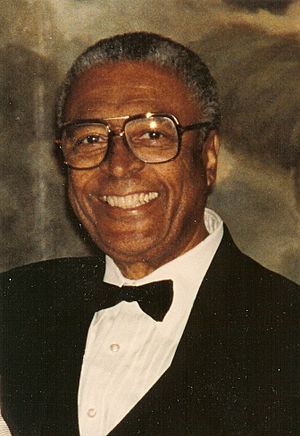George L. Brown (politician) facts for kids
Quick facts for kids
George L. Brown
|
|
|---|---|
 |
|
| 40th Lieutenant Governor of Colorado | |
| In office January 14, 1975 – January 10, 1979 |
|
| Governor | Richard Lamm |
| Preceded by | Ted L. Strickland |
| Succeeded by | Nancy E. Dick |
| Member of the Colorado Senate | |
| In office 1957–1974 |
|
| Member of the Colorado House of Representatives | |
| In office 1955–1957 |
|
| Personal details | |
| Born | July 1, 1926 Lawrence, Kansas, U.S. |
| Died | March 31, 2006 (aged 79) Boca Raton, Florida, U.S. |
| Nationality | American |
| Political party | Democratic |
| Spouse | Modeen |
| Alma mater | University of Kansas, University of Colorado, University of Denver |
| Profession | Politician |
| Military service | |
| Branch/service | United States Army Air Corps |
| Years of service | 1944-1946 |
| Unit | Tuskegee Airmen |
| Battles/wars | World War II |
George Leslie Brown (born July 1, 1926 – died March 31, 2006) was an American politician. He was a member of the Colorado Senate for many years. He also served as the 40th Lieutenant Governor of Colorado. This is a high-ranking state official, similar to a vice president for the state.
During World War II, he was a Tuskegee Airman. These were brave African American military pilots. George Brown was one of the first two Black lieutenant governors in the U.S. since the Reconstruction period. He was also the first outside of any southern state.
Contents
Early Life and Education
George Brown grew up on a farm in Kansas. He was a talented athlete in high school. He played basketball, football, and ran track. He graduated from Lawrence Liberty Memorial High School in 1944.
After high school, Brown went to the University of Kansas. He earned a degree in journalism in 1950. He also continued his studies at other universities. These included Harvard Business School, the University of Colorado, and the University of Denver.
Career in Journalism and Public Service
For 14 years, George Brown worked as a writer and editor. He worked for The Denver Post, a major newspaper. He also had his own Denver radio talk show. He was the first African American editor at a big daily newspaper in the Rocky Mountain region.
Brown also worked in public housing programs in Denver. He taught at the University of Colorado and the University of Denver.
Entering Politics
In 1956, George Brown made history. He was elected to the Colorado State Senate. He served as a state senator for 18 years. He was re-elected five times.
In 1974, he was elected Lieutenant Governor of Colorado. He held this important position for four years. Brown and Mervyn Dymally from California were the first two Black lieutenant governors since the Reconstruction era. This was a big step forward for diversity in politics.
Challenges in Office
During his time as lieutenant governor, George Brown faced some challenges. In 1975, he shared a story about a difficult experience during his military training. He later clarified that the incident had happened to another cadet. He apologized for the misunderstanding.
Later in 1975, there were questions about his travel expenses. He said it was a mistake, and no charges were filed. In 1978, while Governor Richard Lamm was away, Brown was acting governor. He made a decision to pardon a person who had been in prison. Brown believed this person had not received a fair trial. When Governor Lamm returned, he canceled the pardon.
Brown found serving as lieutenant governor "very frustrating." He decided not to run for re-election in 1978.
After Public Office
After his term as lieutenant governor, Brown did not seek public office again. In 1979, he joined the Grumman Corporation. This was a large aerospace company. He became a vice president and later a senior vice president. He was the first African American corporate officer in a major U.S. aerospace company.
He worked as a lobbyist in Washington, D.C. for Grumman. He later worked for a law firm and then for Prudential Securities. He also worked as a banker.
Later Life and Death
George Brown passed away on March 31, 2006. He died from cancer.
See also
- Executive Order 9981
- List of Tuskegee Airmen
- Military history of African Americans

